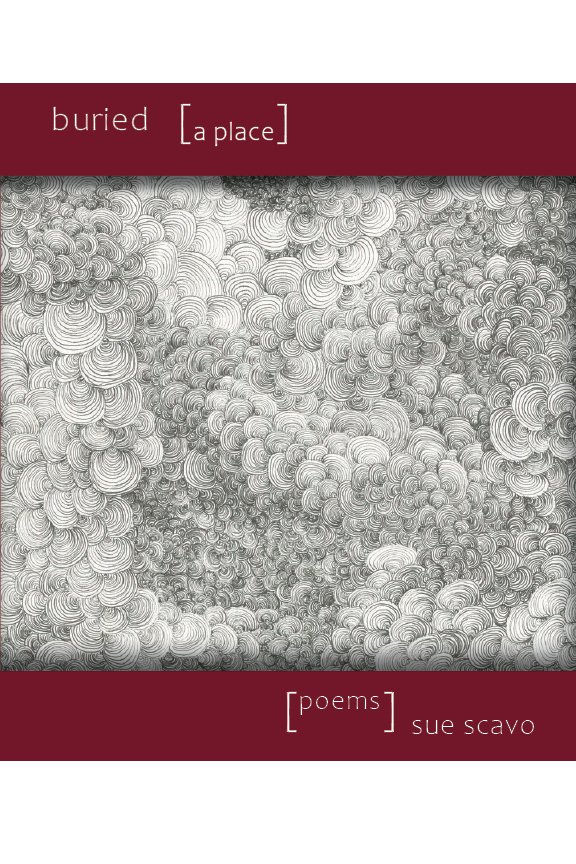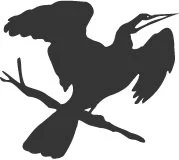
Buried [A Place] by Sue Scavo
Buried [A Place] tracks a woman’s journey, through the shadowy realm of story, relationship, and trauma, in a haunting and challenging re-imagining of Dante’s Inferno. An odyssey that resurrects the self and the feminine from the crushing weight of cultural and personal history, while raising the question of self in relation and correlation to other.
Sample Poem
Canto 1: [in] [half] / [between] [among]
In the middle of being lost, you have to understand — I prayed for a straight path, a true path, a way-through path. In my heart, a remembrance of song forgotten. Just remembrance remembered. You have to understand, I was searching [desperate] for path, as if I [anyone] could find a straight-through, a switch-back, a new way — as if there is arrival — an anywhere where song breaks. I knew there was song. I kept walking as if I could. I was utterly lost. You must understand, utterly. I shiver with it now [as then] how even as it dawned in me [my lostness, this cleaved], I prowled, scrambled, clawed. How shadows formed around me like animals, like dream, how ruthless, ravenous, teeth flash, growl and pounce. My own growl back, [such wildness] frightening. You must understand, how frightening, how driven. How hunted and haunted, between felt and feeling. The path, even tangled, broken. There became no way.
Until, from shadows, shadowed, one formed. Praise to one who would tell me, I am sent to guide you. Praise to one who will say, You cannot face feral. Praise to one who says, There is another way. I was ready to believe any story any voice unpacked, blinding my darkness. It did not matter the story offered, just the fact of a different story, just that there was a way. I would call anyone master, guide, teacher drugged as I was by shattered and tangled. Lead on, lead on — anything, any place, better than here.

Additional Info
Never have I seen the female form so unearthed — not just the body — but the sound of its voice, the shape of its language. As BURIED resurrects, the Father’s house is upended. A house built and maintained by enslaved bodies, sourced from an exploited earth. A house that is now on fire. There is no tongue as deft as Sue Scavo’s to both name the crimes of the patriarchs who lived as gods and to indict her own willingness to be their supplicant. Until they point downward, to Hell, as if the inferno weren’t right here and now. The lie of transcendence is, in truth, the molten core of violence. In a voice all atrium and ventricle, Scavo renounces the descent, reclaims what has been interred. The body as sacred topography. — Amy Irvine, author of Trespass: Living at the Edge of the Promised Land
“In the middle of being lost, you have to understand — I prayed for a straight path, a true path, a way-through path,” so begins Sue Scavo’s tremendous work, BURIED [A PLACE]. Scavo leads the reader, vicariously, often with direct address,along a path of self-retrieval. Embedded in the text is a correlation, argument, and dialog with Dante’s own journey described in Inferno of his Commedia. Scavo delves into the territory of the woman’s experience, her body, her relationships; between mentor/student, brother/sister, father/daughter. She follows the often-perplexing states of love, trust, transference, transgression, violation, to eventual autonomy, and if not forgiveness, understanding. Scavo’s use of language, her tight turn of words, are like stepping stones, like a torch in a dark wood. She is a true new voice in poetry’s landscape. Take notice. — Karla Van Vliet, author of She Speaks Tongues
In poems nearly pre-language and dream-born, in language bracketed and shifting, ruminant, Sue Scavo’s poetic sequence, BURIED [A PLACE], excavates a woman’s soul, “not journey girl, not worthy girl,” from the patriarchal firmament. Questing, trusting, she follows a teacher’s guidance but finds him “greedy in [his] story taking, hoarder of what defines.” Here is myth re-making, the act of hunting for new language inside the body —“the place of past, the place of never-changing, the place of gnarl.” These poems, talking back to Dante’s Inferno and history itself, take us down the long path of coming into knowledge, from “what [I thought] was my memory” toward “our own words as lantern.” If “once there was a girl who filled her breath with salt water / and remembered song,” drowning in order to sing, here, instead, is the story of being told, “Watch your step,” and refusing. “I stepped and stepped.” To dwell in Sue Scavo’s imagination is to suspend time and what we have come to know — so that we may re-know it. — Kerrin McCadden, author of American Wake
